Audi Q6 e-tron vs BMW iX2 - Differences and prices compared
Costs and Efficiency:
When it comes to price and running costs, the biggest differences usually appear. This is often where you see which car fits your budget better in the long run.
BMW iX2 has a evident advantage in terms of price – it starts at 43100 £, while the Audi Q6 e-tron costs 54400 £. That’s a price difference of around 11314 £.
In terms of energy consumption, the advantage goes to the BMW iX2: with 15.30 kWh per 100 km, it’s hardly perceptible more efficient than the Audi Q6 e-tron with 15.60 kWh. That’s a difference of about 0.30 kWh.
As for range, the Audi Q6 e-tron performs clearly perceptible better – achieving up to 656 km, about 178 km more than the BMW iX2.
Engine and Performance:
Power, torque and acceleration say a lot about how a car feels on the road. This is where you see which model delivers more driving dynamics.
When it comes to engine power, the Audi Q6 e-tron has a clearly perceptible edge – offering 490 HP compared to 313 HP. That’s roughly 177 HP more horsepower.
In acceleration from 0 to 100 km/h, the Audi Q6 e-tron is distinct quicker – completing the sprint in 4.40 s, while the BMW iX2 takes 5.60 s. That’s about 1.20 s faster.
In terms of top speed, the Audi Q6 e-tron performs distinct better – reaching 230 km/h, while the BMW iX2 tops out at 180 km/h. The difference is around 50 km/h.
There’s also a difference in torque: Audi Q6 e-tron pulls clearly stronger with 855 Nm compared to 494 Nm. That’s about 361 Nm difference.
Space and Everyday Use:
Whether family car or daily driver – which one offers more room, flexibility and comfort?
Seats: offers more seating capacity – vs .
In curb weight, BMW iX2 is a bit lighter – 1960 kg compared to 2200 kg. The difference is around 240 kg.
In terms of boot space, the Audi Q6 e-tron offers barely noticeable more room – 526 L compared to 525 L. That’s a difference of about 1 L.
In maximum load capacity, the Audi Q6 e-tron performs hardly perceptible better – up to 1529 L, which is about 129 L more than the BMW iX2.
When it comes to payload, Audi Q6 e-tron slight takes the win – 540 kg compared to 510 kg. That’s a difference of about 30 kg.
Who comes out on top?
Overall, the Audi Q6 e-tron shows itself to be dominates this comparison and secures the title of DriveDuel Champion.
It convinces with the more balanced overall package and proves to be the more versatile choice for everyday use.
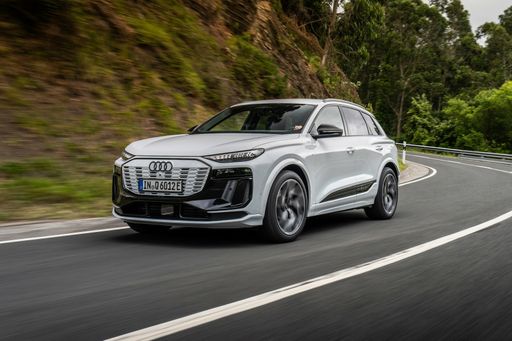 @ Audi AG
@ Audi AG
Audi Q6 e-tron
Costs and Consumption
View detailed analysis
Engine and Performance
View detailed analysis
Dimensions and Body
View detailed analysis
Audi Q6 e-tron
The Audi Q6 e-tron balances sleek, coupe-like styling with a roomy, upscale interior that feels modern without being showy. It delivers refined electric performance and smart tech that make daily driving effortless — the sort of EV that might make petrolheads grudgingly admit they fancy the future.
details @ Audi AG
@ Audi AG
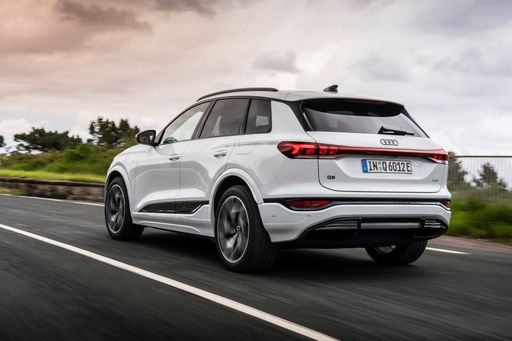 @ Audi AG
@ Audi AG
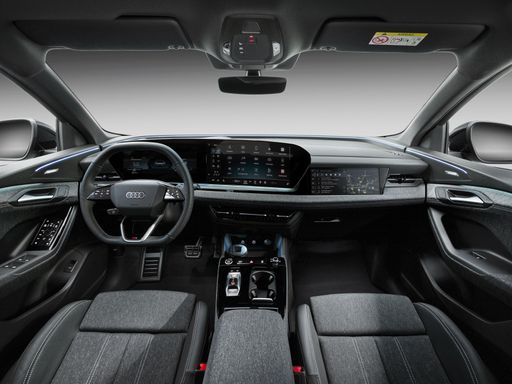 @ Audi AG
@ Audi AG
BMW iX2
The BMW iX2 cuts a sporty silhouette and delivers the buttoned-up premium feel you expect from the brand, wrapped in a compact electric package that’s easy to live with. It’s a smart pick for buyers who want engaging city driving, clever cabin tech and a touch of eco-conscious flair without giving up the fun behind the wheel.
details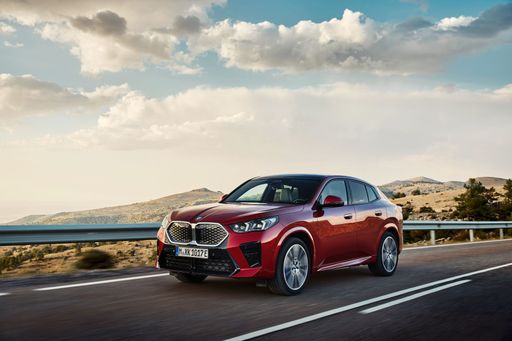 @ BMW Group Press
@ BMW Group Press
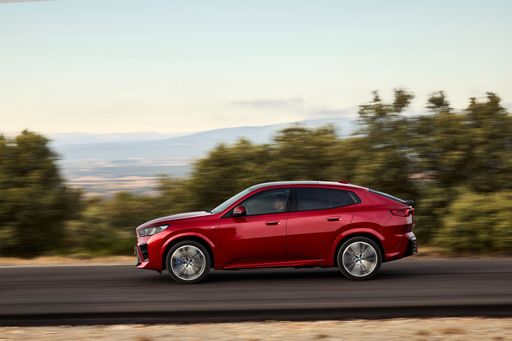 @ BMW Group Press
@ BMW Group Press
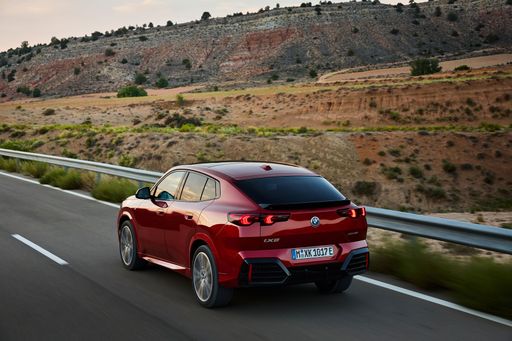 @ BMW Group Press
@ BMW Group Press
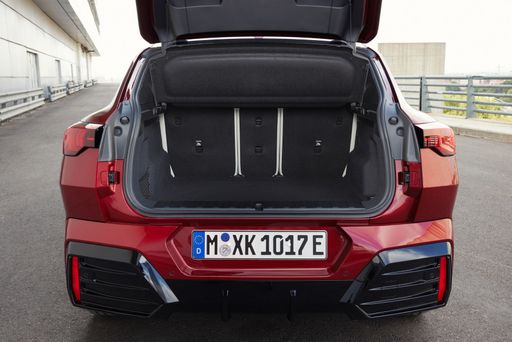 @ BMW Group Press
@ BMW Group Press
 @ Audi AG
@ Audi AG
|
 @ BMW Group Press
@ BMW Group Press
|
|
|
|
Costs and Consumption |
|
|---|---|
|
Price
54400 - 91900 £
|
Price
43100 - 54800 £
|
|
Consumption L/100km
-
|
Consumption L/100km
-
|
|
Consumption kWh/100km
15.6 - 18.9 kWh
|
Consumption kWh/100km
15.3 - 16.3 kWh
|
|
Electric Range
482 - 656 km
|
Electric Range
449 - 478 km
|
|
Battery Capacity
75.8 - 94.9 kWh
|
Battery Capacity
64.80 kWh
|
|
co2
0 g/km
|
co2
0 g/km
|
|
Fuel tank capacity
-
|
Fuel tank capacity
-
|
Dimensions and Body |
|
|---|---|
|
Body Type
SUV
|
Body Type
SUV
|
|
Seats
5
|
Seats
5
|
|
Doors
5
|
Doors
5
|
|
Curb weight
2200 - 2425 kg
|
Curb weight
1960 - 2095 kg
|
|
Trunk capacity
499 - 526 L
|
Trunk capacity
525 L
|
|
Length
4771 mm
|
Length
4554 mm
|
|
Width
1939 - 1965 mm
|
Width
1845 mm
|
|
Height
1665 - 1685 mm
|
Height
1560 mm
|
|
Max trunk capacity
1361 - 1529 L
|
Max trunk capacity
1400 L
|
|
Payload
540 kg
|
Payload
500 - 510 kg
|
Engine and Performance |
|
|---|---|
|
Engine Type
Electric
|
Engine Type
Electric
|
|
Transmission
Automatic
|
Transmission
Automatic
|
|
Transmission Detail
Reduction Gearbox
|
Transmission Detail
Reduction Gearbox
|
|
Drive Type
Rear-Wheel Drive, All-Wheel Drive
|
Drive Type
Front-Wheel Drive, All-Wheel Drive
|
|
Power HP
252 - 490 HP
|
Power HP
204 - 313 HP
|
|
Acceleration 0-100km/h
4.4 - 7.6 s
|
Acceleration 0-100km/h
5.6 - 8.6 s
|
|
Max Speed
210 - 230 km/h
|
Max Speed
170 - 180 km/h
|
|
Torque
450 - 855 Nm
|
Torque
250 - 494 Nm
|
|
Number of Cylinders
-
|
Number of Cylinders
-
|
|
Power kW
185 - 360 kW
|
Power kW
150 - 230 kW
|
|
Engine capacity
-
|
Engine capacity
-
|
General |
|
|---|---|
|
Model Year
2024 - 2025
|
Model Year
2024
|
|
CO2 Efficiency Class
A
|
CO2 Efficiency Class
A
|
|
Brand
Audi
|
Brand
BMW
|
What drivetrain options does the Audi Q6 e-tron have?
Available configurations include Rear-Wheel Drive or All-Wheel Drive.
The prices and data displayed are estimates based on German list prices and may vary by country. This information is not legally binding.
